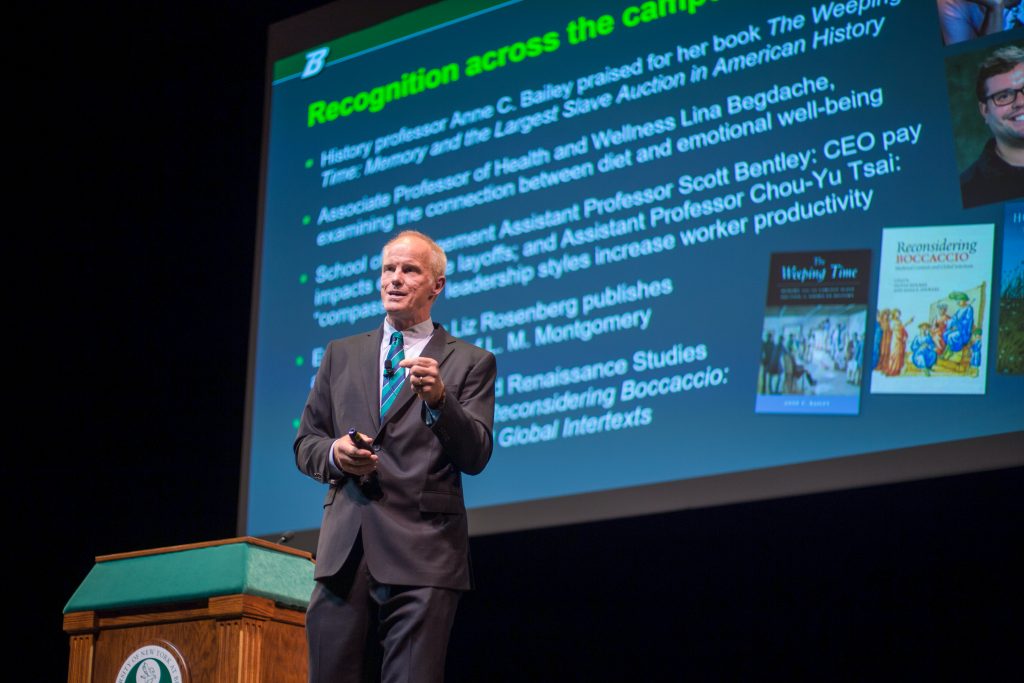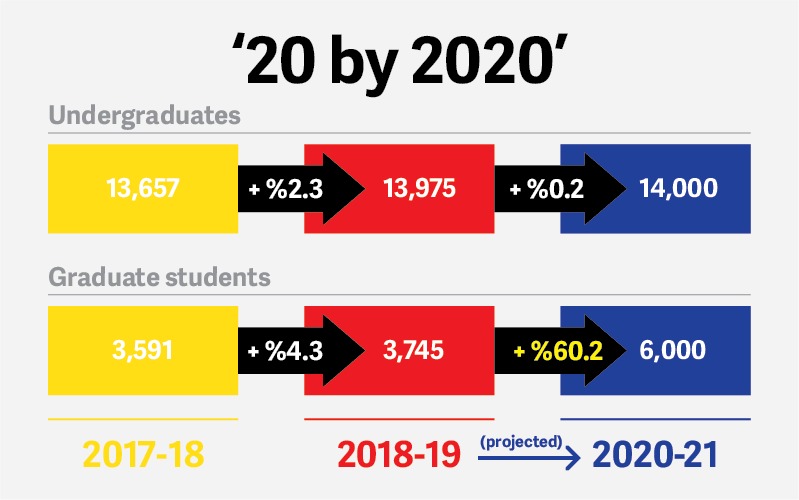
On Tuesday afternoon, Binghamton University President Harvey Stenger addressed the University’s progress and future at his annual State of the University Address in the Anderson Center’s Osterhout Concert Theater.
Highlighting a diverse range of topics, including campus improvements, faculty recognition and various initiatives, Stenger’s speech focused on the University’s achievements and advancements over the past year. He also discussed his goals for the upcoming semesters, which included using the University’s growth to benefit local economies.
“I realized the loss of manufacturing jobs across upstate New York had really devastated our communities, so I looked at it as an opportunity to use the University’s growth — getting bigger and getting better — in order to make our communities even stronger,” Stenger said.
Stenger also discussed the status of his “20 by 2020” goal, a plan to enroll 20,000 students by 2020. Currently, there are 13,975 undergraduates and 3,745 graduate students enrolled at the University, a total increase of 472 from 2017-18. To reach 20,000 students, Stenger said he aims to hold undergraduate enrollment at roughly 14,000 and increase BU’s graduate population to 6,000.
According to Stenger, the University is not entirely on track to meet the goal by 2020, as graduate enrollment is slightly lower than expected. Nevertheless, BU will continue to work toward fulfilling the plan and intends to continue expanding its graduate offerings in an effort to attract more students. Nine new graduate programs were introduced this year, including a master’s program in public health, two multiaward programs in sustainable communities and three advanced certificate programs in subjects such as genocide and mass atrocity prevention. A certificate program in cybersecurity, a master’s in engineering management and a doctorate in pharmaceutical sciences are pending and could be introduced within the coming months.
Because of the expected increase in students over the next several years, the University has hired 160 new permanent staff members since September 2017.
“We have hired faculty at twice the rate that we’ve increased enrollment,” Stenger said. “For the past six years, we’ve increased enrollment by 15 percent and we’ve increased our full-time, tenure and tenure-track faculty by 33 percent — twice the rate of our student enrollment. We grow our staff at exactly the same rate as our student growth, 15 percent, because students’ needs are probably proportional to their population.”
Additionally, salaries have increased for professional and classified staff after almost five years with no raises; however, the salary increases are not funded by the SUNY system, which will force the University to find solutions to offset additional costs. Some of the money will come from the increased enrollment over the next two years, but students can also expect increases in tuition and student fees. A partnership with New York state is also expected to create several long-term solutions for the University’s fiscal challenges.
According to Stenger, the financial complications yield opportunities for the University to grow and become more self-sufficient.
“We think the perspective is, ‘Oh, we have this financial problem we have to solve,’” Stenger said. “It’s not a problem, it’s an opportunity. It’s a chance to look at the part of the glass that’s half empty and decide how we want to fill it.”
Stenger heavily discussed University renovations, including safety and communications improvements on campus that stem from the installation of roughly 160 additional security cameras and 60 panic buttons, updates to the University’s B-Alert system, improved cellphone reception and increased emergency training for staff and student advisers. Renovations are ongoing in Science IV, and Stenger highlighted the recent opening of the School of Pharmacy and Pharmaceutical Sciences’ $60 million facility in Johnson City, which has generated approximately $130 million in private investments in the area.
BU has also been executing the four University initiatives that were developed last year, which include increasing faculty diversity through presidential postdoctoral fellowships, supporting data science research and practice, developing the health sciences campus and establishing health sciences core facilities. According to Stenger, BU has received $332,000 from the SUNY system, matching funds for presidential postdoctoral fellowships. Additionally, 180 faculty members are participating in the newly established Transdisciplinary Area of Excellence in data science, and the health sciences core has established a location in the Center of Excellence, although it is still seeking funding for equipment purchases.
Stenger concluded his address by discussing the University’s fundraising efforts, which will help continue its advancement. According to Stenger, BU is entering its third comprehensive gifts campaign, which has a working goal of $150 million. So far, the campaign has raised $32 million.
Harry Bittker, student representative of the BU Council and a senior majoring in political science, said Stenger’s address helped give him a more comprehensive outlook on the University’s future.
“From my perspective as a student, it really shows how far you have to zoom out to get the full picture of the University and really how big we are, how much we’re doing and all the contexts that we fit into,” Bittker said. “I think this shows how much is going on and how many moving parts there are to this. [It also shows] how much opportunity there is for students to get involved in things that have an impact outside of [BU] and get involved in things that are beneficial to them as well.”
Other attendees said the address helped them visualize BU’s impact on the surrounding communities of Broome County. According to State Senator Fred Akshar, who attended the address, the University’s new health sciences campus will have an undeniable role in revitalizing the economy of Johnson City.
“I, as often as I possibly can, remind my constituency of the importance of Binghamton University and how the University is in fact changing our economy,” Akshar said. “The fact that the University president and everyone else here has a willingness to come off of campus and go into the community and expand and grow and prosper, I think is a very good thing for the people of the Southern Tier.”
Jackie Zou contributed reporting to this article.



